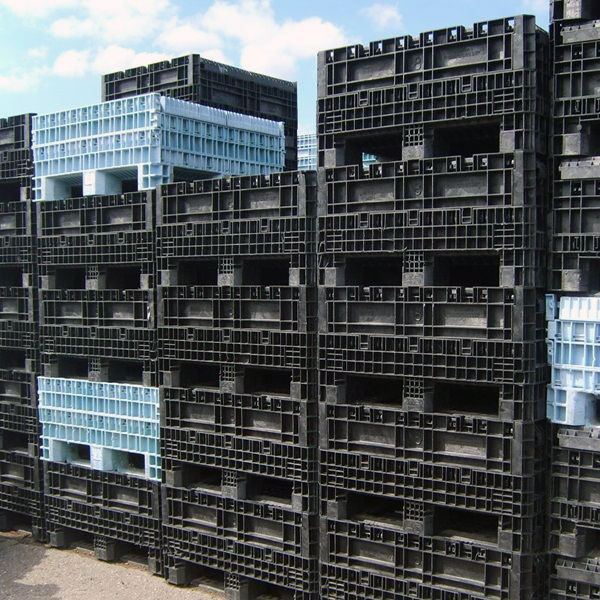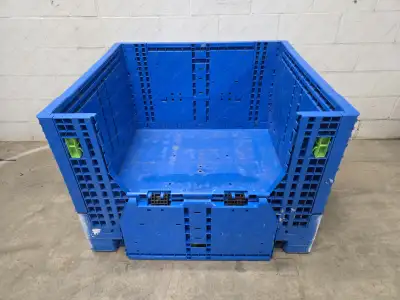The Ultimate Guide to Choosing the Right Bulk Containers for Your Organization Needs
Selecting the proper mass containers is vital for any organization that relies upon reliable logistics. Various sorts of containers exist, each made for certain materials and applications. Elements such as dimension, material compatibility, and regulatory standards play a substantial function in this decision-making process. Comprehending these components can lead to boosted functional performance. Nevertheless, many companies forget necessary elements that could improve their total efficiency and sustainability. What are these factors to consider?
Recognizing Different Kinds Of Mass Containers
Mass containers work as vital tools for services looking for reliable storage space and transportation options. These containers are available in numerous types, each designed to fulfill specific operational requirements. One usual type is the intermediate bulk container (IBC), which is optimal for granulated and liquid materials, providing an equilibrium of capacity and ability to move. An additional popular choice is the mass bag, or FIBC, ideal for dry, flowable products. These adaptable containers are lightweight and can be conveniently moved and stored. For much heavier materials, inflexible bulk containers are typically utilized, providing sturdiness and stability for safe handling. Additionally, there are specific containers tailored for dangerous products, making sure conformity with safety and security guidelines. Recognizing the distinctive features of these mass container types enables companies to make informed choices that enhance logistics and minimize expenses. By choosing the ideal container, business can boost their functional effectiveness and streamline their supply chain processes.
Secret Material Considerations for Bulk Containers
When selecting bulk containers, it is necessary to ponder the materials used in their construction. Factors such as durability, stamina, and chemical compatibility play a crucial duty in guaranteeing the containers satisfy particular operational requirements. Furthermore, weight and transportability issues can affect both performance and transportation logistics.
Product Longevity and Stamina
Longevity and stamina are crucial factors in choosing products for mass containers, as they straight affect the container's capability to endure different environmental conditions and dealing with procedures. Products such as high-density polyethylene (HDPE), polypropylene, and stainless steel are commonly preferred for their durable residential properties, supplying resistance to abrasion, influence, and temperature changes. The option of product likewise affects the overall life expectancy of the container; more powerful products generally lead to much less regular substitutes, leading to set you back savings in time. Furthermore, the weight of the material can impact delivery costs and simplicity of handling. Services need to consider their particular operational environments and the potential for deterioration to ensure peak resilience and toughness in their bulk container option.
Chemical Compatibility Factors
Recognizing chemical compatibility is important for choosing bulk containers, as the products used need to resist the particular materials they will certainly hold. Numerous elements influence compatibility, including the chemical nature of the contents, temperature level, and duration of storage space. As an example, corrosive chemicals might require containers made from stainless-steel or specialized plastics that stand up to degradation. Furthermore, responsive substances can generate heat or gases, necessitating aired vent or pressure-rated containers. The option of container product, whether steel, polyethylene, or polycarbonate, ought to line up with the chemical residential or commercial properties of the stored substances to prevent violations or leakages. Ultimately, a complete examination of these compatibility elements assures safe handling and storage, safeguarding both personnel and the environment while keeping item honesty.
Weight and Transportability Issues
Selecting mass containers entails not only reviewing chemical compatibility however additionally taking into consideration weight and mobility. Organizations need to examine the ease of handling and transport to optimize effectiveness. Lightweight materials like high-density polyethylene (HDPE) or aluminum can assist in simpler activity and reduce delivery prices. On the other hand, larger containers might give boosted toughness but can impede wheelchair, especially in atmospheres calling for regular relocation. Additionally, the style of the container ought to permit convenient lifting and piling, guaranteeing ergonomic safety and security for employees. Companies need to also take into consideration the framework available for transport; for instance, containers suitable with forklifts or pallet jacks can simplify procedures. Inevitably, the appropriate equilibrium in between weight and transportability directly affects functional performance and cost efficiency.
Sizing Your Mass Containers for Optimum Efficiency
When sizing bulk containers, businesses need to very carefully assess the dimensions required to fit their particular products. In addition, weight capacity is an important element that affects effectiveness and security throughout transportation and storage space. Reliable sizing not just maximizes space yet likewise optimizes functional process.
Identifying Container Dimensions
Choosing the best dimensions for bulk containers is vital for optimizing performance in storage and transport. Organizations need to assess their particular demands, considering aspects such as available room, the nature of here the goods being stored, and the approaches of transport utilized. Precise dimensions assure that containers fit ideally in storage facilities and vehicles, lessening lost room and decreasing handling time. Requirement dimensions can provide convenience, but personalized measurements could be needed for distinct needs or to accommodate certain items. Additionally, it is essential to examine stacking abilities and ease of access, as these factors influence total functional efficiency. Ultimately, the appropriate dimensions result in boosted organization and structured logistics, profiting the overall productivity of business.
Weight Capability Considerations
Comprehending weight capability is crucial for companies intending to enhance their mass container effectiveness. The weight ability of a container straight affects storage space capacities, transport logistics, and general functional prices. Selecting containers with the appropriate weight restrictions ensures that services can safely save and transfer their goods without taking the chance of damage or compliance concerns. Overloading containers can lead to architectural failings, while underutilizing ability outcomes in lost resources. When picking containers, it is vital for businesses to analyze their item weights and think about any regulatory requirements. In addition, variables such as the type of product, intended usage, and environmental problems need to likewise affect weight capacity choices. By evaluating these elements, businesses can improve efficiency and assure a structured supply chain.
Regulative Compliance and Safety Criteria

Regulatory compliance and safety and security standards play a crucial function in the option of bulk containers for services. Organizations has to ensure that their containers fulfill various regulations established by local, nationwide, and global authorities. These criteria usually pertain to material safety and security, architectural stability, and appropriate labeling, which assist stop crashes and ensure the safe transportation of products.
Furthermore, adherence to industry-specific guidelines, such as those from the Food and Medicine Administration (FDA) or the Occupational Security and Wellness Management (OSHA), is important for firms dealing with unsafe products or food items. Non-compliance can result in penalties, legal concerns, or damages to a service's online reputation.
Businesses should likewise take into consideration the container's compatibility with the materials being stored or carried to stay clear of contamination or chemical reactions (used collapsible containers). To summarize, recognizing and implementing regulatory compliance and safety and security standards is necessary for the effective and liable use of bulk containers
Sustainability Alternatives for Eco-Friendly Mass Containers

Companies are additionally checking out options made from recycled materials, which not only save resources however additionally sustain the reusing market. Moreover, developments in design allow for lighter containers that call for much less energy to transport, further enhancing sustainability. By integrating these environmentally friendly bulk container options, organizations can show their dedication to ecological stewardship while meeting customer need for sustainable methods. This change not just assists the world however can likewise boost brand reputation and client loyalty.
Cost-Effectiveness and Budgeting for Bulk Containers
While numerous services concentrate on sustainability, cost-effectiveness remains a vital aspect when picking mass containers. Organizations has to evaluate the initial purchase price, in addition to long-lasting functional costs, to ensure monetary stability. Variables such as reusability, maintenance, and longevity play a significant role in determining overall expenditures.
Purchasing high-quality containers might yield higher in advance costs but can result in cost savings with lowered substitute rates and reduced waste. In addition, businesses ought to consider transportation expenses and storage space effectiveness, as these can impact the overall budget.

Regularly Asked Inquiries
How Do I Establish the Right Container for Hazardous Materials?
To figure out the ideal container for harmful materials, one must evaluate compatibility with the substance, consider the container's material, check for regulatory compliance, and analyze ability and security features to assure correct handling and storage space.
Can Mass Containers Be Custom-made for Details Products?
Yes, bulk containers can be personalized for particular products. used plastic containers. Numerous features, such as product, dimension, and style, can be tailored to fulfill one-of-a-kind needs, guaranteeing suitable safety and efficiency for transferring and keeping various products
What Is the Ordinary Life-span of Different Mass Container Kind?
The average life-span of mass container kinds differs; plastic containers last 5-10 years, steel containers 10-20 years, and wooden containers usually last 3-7 years, relying on usage, upkeep, and environmental problems.
How Should I Clean and Maintain Mass Containers?
To clean up and preserve bulk containers, one must routinely inspect for damages, remove deposit, laundry with appropriate cleaning agents, wash extensively, and warranty proper drying prior to storage space. Adhering to supplier guidelines improves longevity and safety and security throughout usage.
Exist Rental Alternatives for Bulk Containers Available?
Yes, many firms offer rental choices for bulk containers, offering flexibility for organizations. These rentals can suit numerous requirements, permitting companies to handle inventory effectively without the dedication of purchasing containers outright.
Sturdiness and toughness are vital elements in choosing materials for bulk containers, as they straight influence the container's capability to endure various environmental problems and dealing with procedures. Understanding chemical compatibility is vital for selecting mass containers, as the products utilized must withstand the details materials they will certainly hold. Comprehending weight capability is essential for services intending to enhance their bulk container effectiveness. Regulative compliance and safety criteria play an important role in the option of mass containers for organizations. While lots of businesses focus on sustainability, cost-effectiveness stays an important factor when picking mass containers.